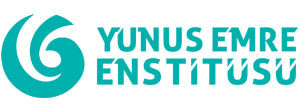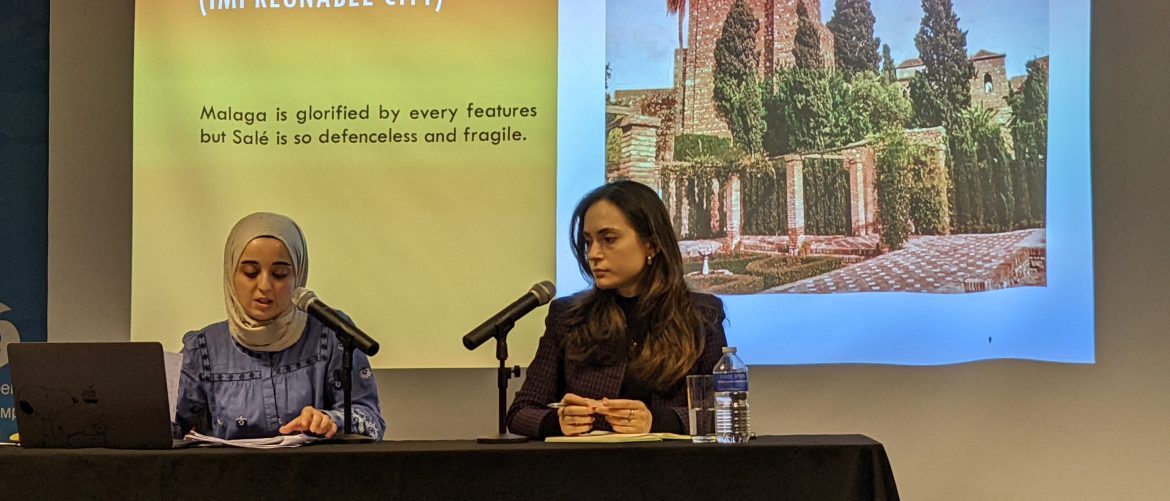Yunus Emre Institute in London was delighted to organise another well-attended Young Scholar Seminar Series talk! This talk on Tuesday 15th March 2022 discussed the “Memoirs of an Exile: An Andalusian historian’s travelogue of Malaga and Salé” with SOAS PhD candidate Ümmügülsüm Kurukol.
Delving into the travelogue of an 14th century Andalucian historian who was exiled to Salé (Morocco), Yunus Emre Institute in London hosted another brilliant iteration of its Young Scho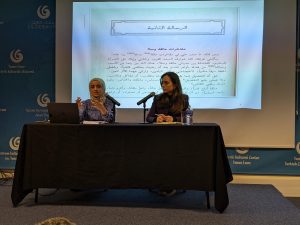 lars series on Tuesday 15th March 2022. The fully-booked event began with a talk by SOAS PhD candidate Ümmügülsüm Kurukol which was followed by a lively Q&A session and traditional Turkish refreshments for the audience to enjoy.
lars series on Tuesday 15th March 2022. The fully-booked event began with a talk by SOAS PhD candidate Ümmügülsüm Kurukol which was followed by a lively Q&A session and traditional Turkish refreshments for the audience to enjoy.
Travelogues are important materials for historical studies. The talk focussed on the literary work of Ibn al-Khatị̄b, a 14th century writer known for his unique style of historical writing and was held in high esteem as an expert of Andalusian history by his contemporaries. His travelogue provides limited but amazingly detailed work about his period by writing about his observations of Malaga (Andalusia) and Salé (Morocco) while he was in exile. Kurukol, exploring his work in the talk by not only relaying the impressive details about Malaga, an Andalusian city, in a comparison with a Moroccan city, Salé, but also Ibn al-Khatị̄b’s contributed to the field of travel writing by his travelogues and his interesting writing style.
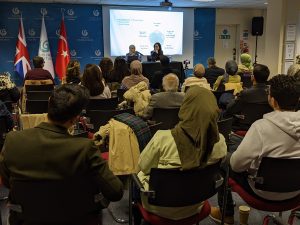 First pressing the importance and nuances of analysing historical travelogues, Kurukol discussed the reasons she chose to explore these texts. She explained that her interest in history stemmed from wanting to build a bridge between the present and the past while preserving the person in the history she was writing. After discussing the challenges she faced while delving this understudied branch of history, Kurukol introduced Ibn al-Khatị̄b and his work. She led the audience through the travelogue as the author compared Malaga and Salé, the former which he bestowed his greatest compliments and the latter to which he prescribed the worst ills. Explaining the significance of the language he used, the religious connotations he presented and the context in which he was writing, the audience were left enthralled in a fascinating area of history that has been rarely covered.
First pressing the importance and nuances of analysing historical travelogues, Kurukol discussed the reasons she chose to explore these texts. She explained that her interest in history stemmed from wanting to build a bridge between the present and the past while preserving the person in the history she was writing. After discussing the challenges she faced while delving this understudied branch of history, Kurukol introduced Ibn al-Khatị̄b and his work. She led the audience through the travelogue as the author compared Malaga and Salé, the former which he bestowed his greatest compliments and the latter to which he prescribed the worst ills. Explaining the significance of the language he used, the religious connotations he presented and the context in which he was writing, the audience were left enthralled in a fascinating area of history that has been rarely covered.
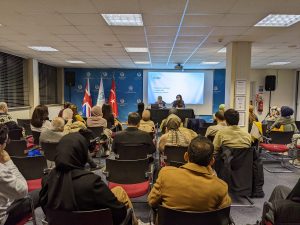

Ümmügülsüm Kurukol is currently a PhD candidate in the Faculty of Languages, Cultures and Linguistics of Near and Middle East Department, SOAS, University of London. After her BA in Theology from Marmara University, Istanbul, she completed her MA in Islamic Studies at SOAS. Her main research interest is about the meaning of travel, manifestations of travellers and conceptual changes in Muslim travel writing between 10-17th centuries, according to the travellers from different Islamic lands and their narrations about Muslim cities.



This event was streamed live on the Yunus Emre Institute in London Facebook and YouTube accounts, @yeelondra. You can also stay up to date with the events, courses and more that are run via Yunus Emre Institute in London’s website, www.yeelondon.org.uk, or their social media, @yeelondra.
